NAIROBI: Sr. Winnie Mutuku was serving late lunch to 14 street boys inside the Cathedral of the Immaculate Heart compound of the Diocese of Kitale in the western part of Kenya when she received an unfamiliar call from a friend.
For a moment, the member of Daughters of Charity of St. Vincent De Paul stood transfixed in one place and listened to a congratulatory message from someone who introduced himself as an official in the Ministry of Labour and Social Protection in the country’s capital, Nairobi.
“He called and told me, ‘congratulations Sister Winnie. You have just been accorded a state commendation by President Uhuru Kenyatta for your service during the COVID-19 pandemic.’ It must have been a few minutes to 3 p.m.,” recalls Sr. Winnie in an interview with ACI Africa Tuesday, June 2.
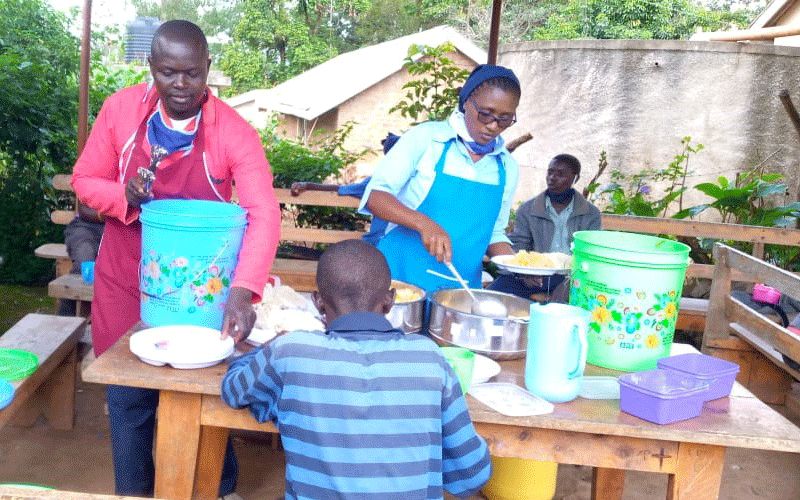
The government official then forwarded her a screenshot of a list that had had 68 names of Kenyans who had demonstrated leadership during the pandemic. She was at position 56 on a list that had names of doctors, nurses, journalists and other people from different professions who had been accorded the Presidential Order of Service, Uzalendo Award.
President Kenyatta made the announcement on Monday, June 1 when Kenya marked its 57th Madaraka day celebration to commemorate the day, in 1963, when the country attained independence after decades of colonization.
The President said the award was in recognition of distinguished and outstanding service to Kenya in helping steer the country through the coronavirus pandemic.
“To recognize and honor those Kenyans who have exhibited exemplary service, sacrifice, patriotism, heroism and high sense of civic duty in helping steer Kenya through the current Pandemic; and on behalf of an eternally grateful Nation, I have on this 1st Day of June, 2020 issued an Executive Order establishing a new National Award and State Commendation – The Presidential Order of Service – Uzalendo Award,” President Kenyatta said in the virtual celebration that was broadcast from State House in Kenya’s capital, Nairobi.
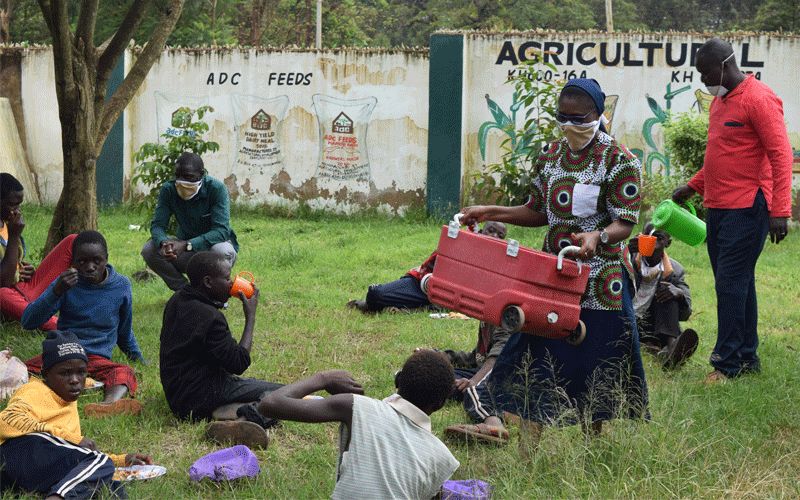 He added, “The names of the inaugural recipients of this high National Honour have been published in a Special Issue of the Kenya Gazette dedicated to them.”
He added, “The names of the inaugural recipients of this high National Honour have been published in a Special Issue of the Kenya Gazette dedicated to them.”
What followed was a chain of congratulatory messages that flooded Sr. Winnie’s mobile phone even as she tried to concentrate on the street boys.
“I usually allow the boys to have fun after the meal and to dance to some music, which I play from my mobile phone. I didn’t have the time to reply to any of the congratulatory messages as the boys were already begging me to play the music,” says Sr. Winnie.
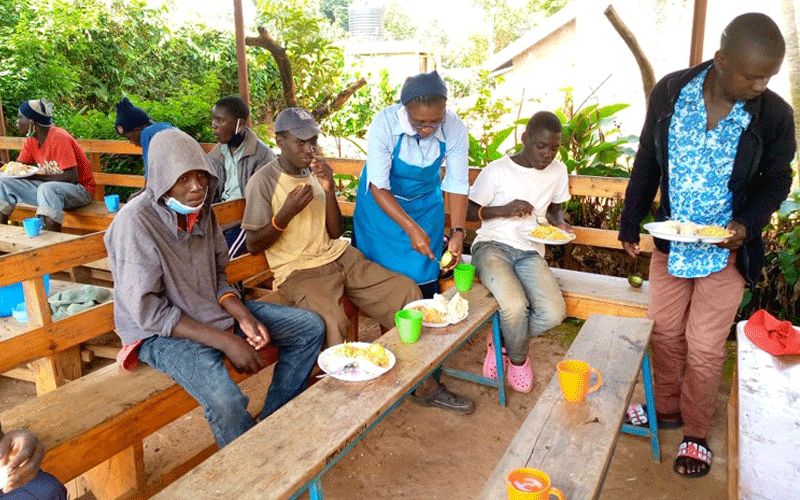 The Kenyan-born nun who was featured by ACI Africa for her selflessness in feeding street boys amid the COVID-19 pandemic says she was caught by surprise at the Head of State’s announcement.
The Kenyan-born nun who was featured by ACI Africa for her selflessness in feeding street boys amid the COVID-19 pandemic says she was caught by surprise at the Head of State’s announcement.
“It was totally unexpected. We are not doing anything special on the streets with the boys. All I do as a Daughter of Charity (Sister) is not worth any State recognition,” the humble nun said, and added, “I have been very puzzled as to who gave my name to the government. I would really love to know who it was so that I ask them what they found so special about me and my project.”
Sr. Winnie caught the global attention through Upendo Street Children (USC) Project, a charity organization she founded in Kenya’s Catholic Diocese of Kitale to restore dignity to the homeless children, to empower them in education and to finally reunite them with their respective families.
In an interview with ACI Africa in April, Sr. Winnie shared the challenges that street boys in Kitale faced amid Kenya’s dusk-to-dawn curfew that was characterized by police brutalities against people who would be found loitering on streets during curfew hours.
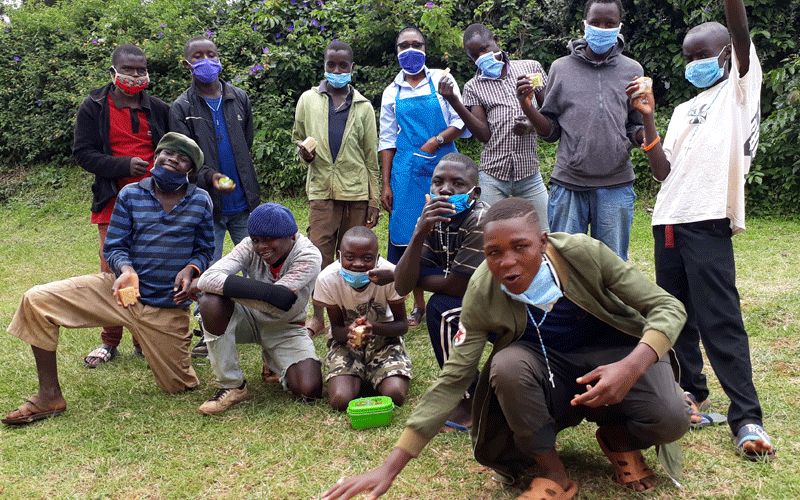 Ten boys who had nowhere to go after the center reunited 23 boys with their families through an emergency integration program were forced to spend nights in forests around the town since they were no longer wanted on the streets.
Ten boys who had nowhere to go after the center reunited 23 boys with their families through an emergency integration program were forced to spend nights in forests around the town since they were no longer wanted on the streets.
Sr. Winnie was shown in many images braving rains to feed the street boys in the open before they would retire to their hideouts, away from brutal police officers and equally hostile Kitale residents.
“No one wants to see the boys on the streets. When the police on patrol see them on the streets at night as they (police) enforce the curfew, they beat them very badly. Many street boys I know now retire to forests and railway centers for the night and only show up on the streets at daybreak,” said Sr. Winnie said in the April interview with ACI Africa.
The COVID-19 turbulence had not stopped Sr. Winnie from reaching out to the boys who were still living on the streets as well as conducting home visits for those who had been reunited with their families.

When she spoke to ACI Africa before the Presidential award, Sr. Winnie had mobilized the 10 boys to Kitale showground where she assembled the boys for a meal and gave them a separate share to eat from their hideouts.
Mondays, Wednesdays and Fridays are days when staff at USC take food to waiting street children at the Kitale showground where the boys like hanging out. Tuesdays and Thursdays are reserved for conducting home visits to check on the progress of the boys in their homes.
“We encourage the boys to carry food containers where we serve them food on three weekdays. After eating the meal together, they take the rest away in their food containers,” Sr. Winnie said.
But on Tuesday, June 2, a day after the award, Sr. Winnie reported that she had already secured a space within the Sacred Heart Cathedral compound where the boys eat their food with a roof over their head.
“Kitale is an interesting place. It is always raining over here and sometimes it rains without warning. That’s why most of our meals were served in the rains. But now I’m glad we have a safe place where we can eat together in peace,” she says and adds, “Many days I was so emotional seeing the children in the rain. Their image lingered in my head every time I left them in those rains.”
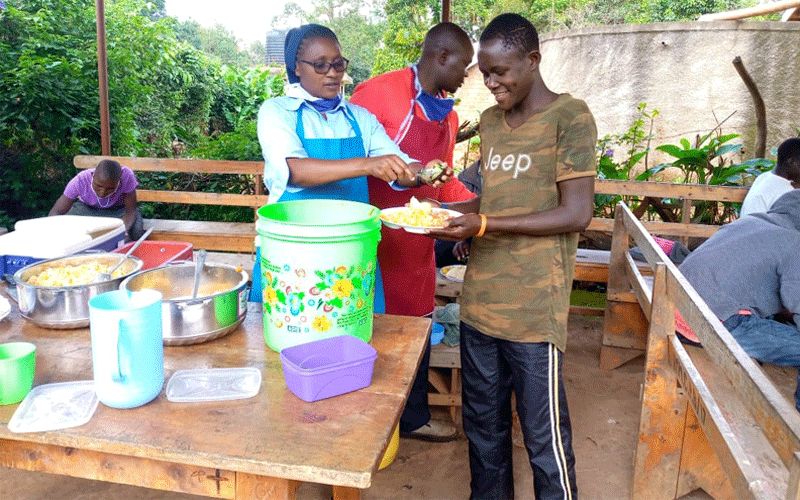 Additionally, she says, some adults showed up whenever her team brought food to the showground and she had no way of sending them away so that the boys would have enough to eat.
Additionally, she says, some adults showed up whenever her team brought food to the showground and she had no way of sending them away so that the boys would have enough to eat.
Weighed down by the pain of the street children, Sr. Winnie approached the Vicar General of Kitale Diocese who gave her project a space within the Immaculate Heart Cathedral premises and she has since relocated the boys from the open showground.
“Today, the boys don’t have to eat their food in a rush for fear of rain. They also have time to socialize after a meal because they have a roof over their head,” she says.
Additionally, the center has seen a consistency in attendance for meals, which is a plus for the organization that is interested in establishing a relationship with the boys for a successful integration process.
Two of the boys that had been reunited with their families after the announcement of the curfew have already come back on the streets.

“Two is not a bad number considering the haphazard way we reunited the boys with their families. In fact, I thought that nearly all of them would be back on the streets because a proper integration process was not followed in reuniting them with their families. We did everything in a rush because of the curfew,” Sr. Winnie says.
However, Upendo Street Children has had a new set of challenges, including stalled recruitment and heavy expenditure that extends to families of the boys.
“These days, we are feeding boys who were not in our system because when they come, we can’t send them away. We also can’t recruit them in our program because the COVID-19 environment does not allow for proper interviews and follow-up interventions for a complete recruitment process,” Sr. Winnie says.
She adds, “Now, we are only stuck at feeding the boys yet our objective goes beyond just feeding. We want to transform the lives of these boys. We want to give them family, both at the center and back where they came from. We want to leave an impact in the lives of these boys because I believe that they don’t belong on the streets.”
“We are spending more than we used to spend before COVID-19. Fuel to go around on home visits is already consuming a lot of money,” she says, adding that she brings 8 kilos of maize or maize flour, 2 kilos of beans, cooking oil, soap and other basic items on each visit to sustain the families of the street boys. Sometimes, she brings clothes and beddings depending on need.
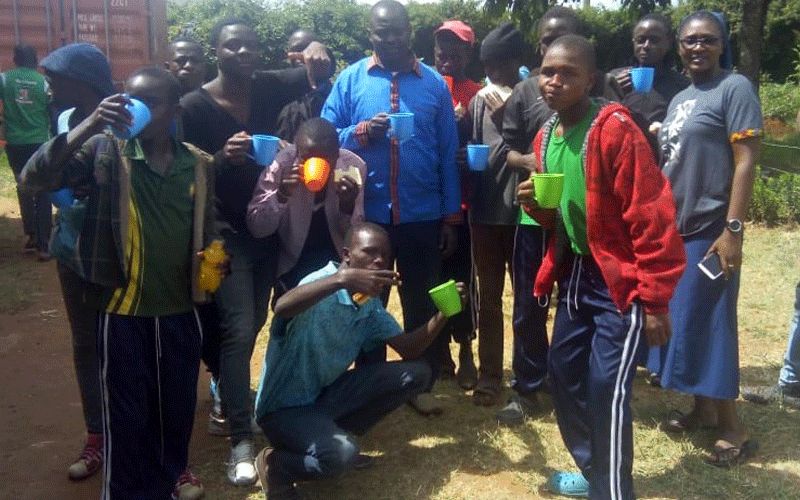 But Sr. Winnie’s greatest desire, she reveals, has been to see street children in Kitale at a permanent facility where they will get life skills and other training. It is the only thing that came to her mind when she received news that she had been listed for the Uzalendo Award.
But Sr. Winnie’s greatest desire, she reveals, has been to see street children in Kitale at a permanent facility where they will get life skills and other training. It is the only thing that came to her mind when she received news that she had been listed for the Uzalendo Award.
“We applied to collaborate with the County in order to have a good space where we can intergrate more training skills to the children and monitor the consistency in rehabilitation process,” she says.
Meanwhile, the alumna of Tangaza University College (TUC), a constituent College of the Kenya-based Catholic University of Eastern Africa (CUEA), has been hailed by her alma mater for impacting lives in her ministry.
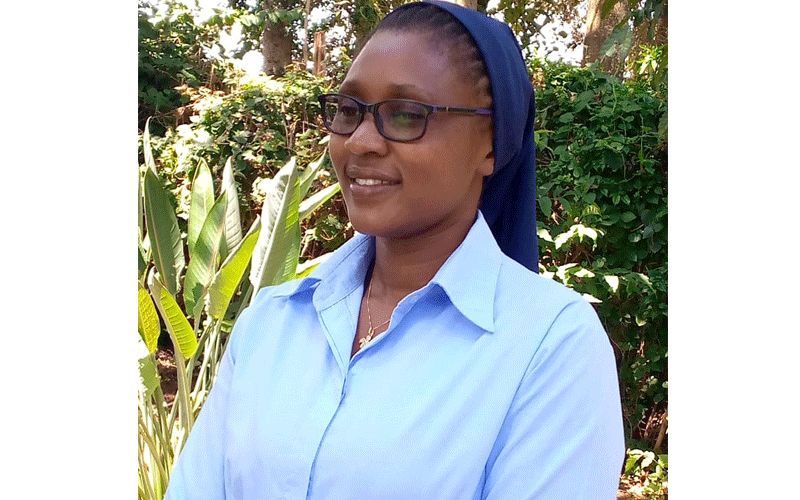 Referencing the award in a communique dated Tuesday, June 2, the Director of TUC’s Institute of Social Communication (ISC), Fr. Cleophas Tesha said, “We are happy that one of such recognized and honoured persons is our immediate former student (alumna) who graduated in October last year namely, Sr. Winnie Mutuku of the Daughters of Charity of St. Vincent de Paul.”
Referencing the award in a communique dated Tuesday, June 2, the Director of TUC’s Institute of Social Communication (ISC), Fr. Cleophas Tesha said, “We are happy that one of such recognized and honoured persons is our immediate former student (alumna) who graduated in October last year namely, Sr. Winnie Mutuku of the Daughters of Charity of St. Vincent de Paul.”
Fr. Cleophas expressed his appreciation for the highly talented nun who, he said, was using her networking, collaboration and communication skills and confidence acquired during her training at TUC “to motivate, promote and grow talents among the boys she serves.”
“May her recognition remain a witness to all of our students that yes, Tangaza is one of the best places to learn and experience holistic growth,” the Tanzanian-born Dominican Cleric said and added, “Indeed our motto at Tangaza University College, namely, “Teaching Minds, Touching Hearts and Transforming Lives” continues to speak louder.”


